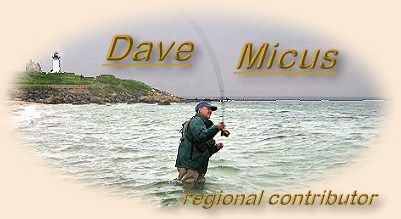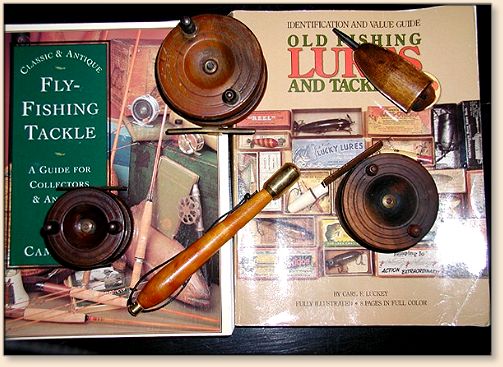|
Validating the old saying "a fool and his money
are soon parted," I have recently begun
collecting antique wooden fly reels. I'm not
sure why. It's unlikely they'll ever be worth
much more than I paid for them, but they are
over 100 years old and there is what can only
be described as a spirit in these reels, as if
the very wood absorbed the passion of its owner
in a way metal never could.
Each has a story to tell.
One reel I purchased is noticeably darker on two
thirds of the wooden spool than on the other one
third. I tried to lighten the wood with stripper
(I know, ruining the patina and the value, but I
can't help myself sometime) to no avail. I showed
the reel to a friend who is a master carpenter, and,
after gazing long and hard while he turned the reel
over and over in his hands, he pronounced his
judgment -- the reel, at least part of it, was
exposed to fire. Not long enough to burn the wood
and cause real damage, but long enough to discolor it.

How does a fly fishing reel end up in the fire?
Maybe the same way a golf club ends up in the
water hazard. After a particularly bad day fishing
the Test, did our sport fling his reel into the fire?
It would have to be worse than just a no fish day,
more like a 45-pound king breaking the cast as it
was brought to the net. Later, at the lodge, our
angler drank and brooded, then drank and brooded
more. The visions of the king darting off with a
flick of its huge tail becomes too torturous, and,
to the surprise of all present, our sport takes his
reel and flings it into the fire. A quick thinking
gilley rescues the tackle, but not before it suffers
the damage.
Or maybe the opposite occurred. Perhaps, during an
evening's celebration after an exceptional day salmon
fishing, the single malt whiskey flowed a little too
freely, and our fishing gent, intoxicated with sport
and spirits, set his rod a bit too close to the
inviting hearth, singeing his prize reel but rescuing
it before it was ruined. I hope this is the case.

Another reel appears to be in perfect shape except
that one of the ebony handles is gnawed, clearly
the delinquency of a puppy, as no mature dog of a
sportsman would have the impudence to nibble his
master's prize reel. Perhaps it was a day of a
pheasant hunt, and the puppy, still in the training
stages, was left at home while the more experienced
dogs enjoined the game. The pup barks, running from
door to door, but to no avail; they are already gone.
But then his acute sense of smell detects something,
that aroma of gun oil that the pup so inextricably
links to his master's scent. The puppy follows his
nose, and in a corner of the den, atop an old wicker
creel next to a greenheart rod, he finds the recently
lubricated reel. It's too big to grasp in his small
mouth, so he takes it by the handle and carries it
with him the rest of the day, stopping every so often
to nibble on his trophy until his sporting master
returns. Or at least that's how I envision it.
The reel with the most to tell is one in
pristine condition that, other than a bit
of tarnish on the brass fittings, looks as
if it just came off of an outfitter's shelf.
Was it a gift or impulse purchase that just
never made it streamside? I imagine quite
the opposite, a reel painstakingly disassembled
after every outing, the shaft and gears carefully
oiled, the wood lovingly polished, then stowed
away in a safe spot until it once again felt the
tug of a trout. Passed down through generations,
it has now come in my possession, and I am obliged
to maintain the same high standard set by the former
owner. Oh, I won't fish it, but I will clean it and
oil it and handle it so that, like the velveteen
rabbit, it knows it was loved.
These are the stories of just the first three
reels I collected; I've since purchased six more.
They, too, have tales to tell, but we'll save
those yarns for another time... ~ Dave

About Dave:
 Dave Micus lives in Ipswich, Massachusetts. He is an
avid striped bass fly fisherman, writer and instructor.
He writes a fly fishing column for the Port City Planet
newspaper of Newburyport, MA (home of Plum Island and Joppa Flats)
and teaches a fly fishing course at Boston University.
Dave Micus lives in Ipswich, Massachusetts. He is an
avid striped bass fly fisherman, writer and instructor.
He writes a fly fishing column for the Port City Planet
newspaper of Newburyport, MA (home of Plum Island and Joppa Flats)
and teaches a fly fishing course at Boston University.
|






 Dave Micus lives in Ipswich, Massachusetts. He is an
avid striped bass fly fisherman, writer and instructor.
He writes a fly fishing column for the Port City Planet
newspaper of Newburyport, MA (home of Plum Island and Joppa Flats)
and teaches a fly fishing course at Boston University.
Dave Micus lives in Ipswich, Massachusetts. He is an
avid striped bass fly fisherman, writer and instructor.
He writes a fly fishing column for the Port City Planet
newspaper of Newburyport, MA (home of Plum Island and Joppa Flats)
and teaches a fly fishing course at Boston University.